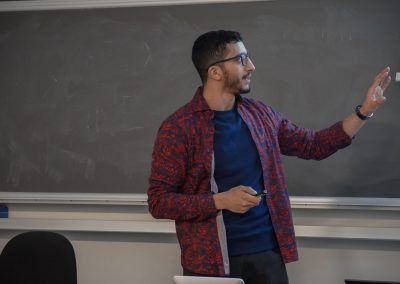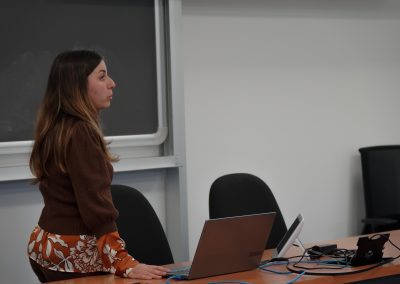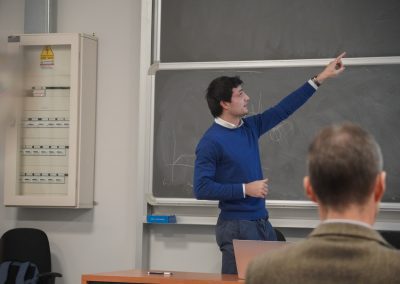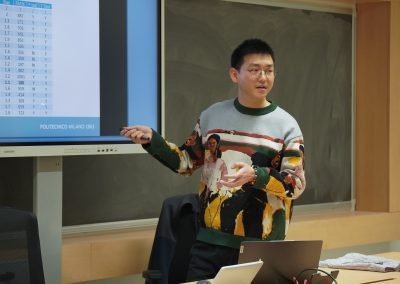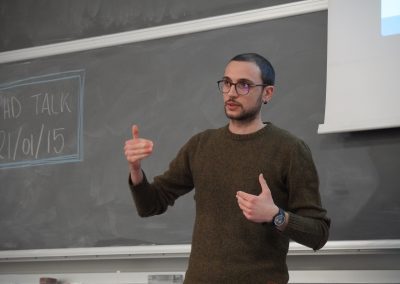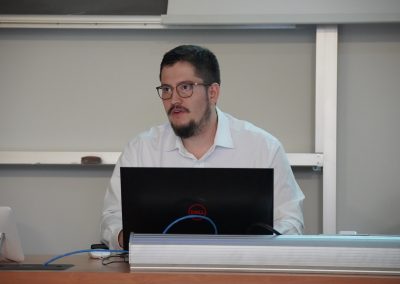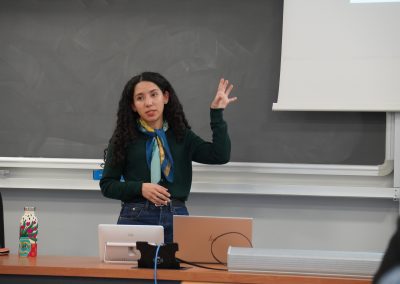PhDTalks
PhDtalks è una serie di seminari e discussioni tra dottorandi. Gli eventi sono auto-organizzati dai dottorandi del Dipartimento di Ingegneria Civile e Ambientale (DICA). I relatori sono scelti su base volontaria tra i candidati iscritti ai corsi di dottorato in Ingegneria Strutturale, Sismica e Geotecnica (ISSG) e Ingegneria per l’Ambiente e le Infrastrutture (IAI).
Gli eventi si svolgono ogni due settimane nel tardo pomeriggio e sono seguiti da un piccolo rinfresco finanziato dal Dipartimento DICA. L’iniziativa mira a fornire un terreno informale e rilassato per gli studenti di dottorato per discutere i progetti di ricerca in corso e condividere conoscenze e competenze, migliorando il networking con gli altri candidati.
Regolamento e Premi
A partire dall’edizione di quest’anno di PhDTalks, sono previsti dei premi per ogni ciclo di seminari, uno per il dottorato IAI ed uno per il dottorato ISSG.
La partecipazione è gratuita e ogni partecipante può concorrere con una sola presentazione ogni due cicli di seminari. La migliore presentazione per ciascun corso verrà premiata con il Premio “PhDTalks” del Dipartimento di Ingegneria Civile e Ambientale, che consiste in un budget di 1.000,00 Euro a disposizione del vincitore per partecipazioni a convegni o pubblicazioni scientifiche open access.
Per maggiori informazioni e per scaricare il modulo d’iscrizione, consultare il Regolamento PhDTalks.
Calendario Eventi
Presentazioni
Uncertainty quantification and spatial biases assessment in precipitation forecasts: a methodology for real-time flood forecasting applications
Enrico holds a M.Sc in Environmental and Land Planning Engineering, obtained at Politecnico di Milano in 2021. He is currently a PhD candidate (37-th cycle) in Environmental and Infrastructure Engineering, in his PhD he is collaborating with the civil protection of Lombardy Region (CFMR) doing research on the enhancement of regional flood early warning system. His research is mainly focused on the use of machine learning algorithms for flood forecasting, nowcasting and flood warning applications, as well as uncertainty quantification of meteorological predictions.
In his spare time, he enjoys playing chess (with poor results), hiking, climbing and skiing.
Towards the realization of Submerged Floating Tunnels
Stefano is a PhD Candidate in Structural, Seismic and Geotechnical Engineering (38° cycle). He holds a Master of Science in Structural Engineering from Politecnico di Milano, obtained in 2022, and is currently enrolled in the third year of the PhD program. His research focuses on developing a multiscale approach to address the nonlinear dynamic behavior of slender offshore structural elements and to describe fatigue damage accumulation under hydrodynamic loading conditions, by means of both numerical and analytical tools.
In his free time Stefano enjoys traveling, hiking, playing tennis and padel.
Simulating the effect of Nature-based Solutions as a mitigation tool for Urban Heat Islands
Accelerating Materials Design with Deep Learning: Multiscale Modeling and Inverse Design Strategies
José Pablo completed his Bachelor’s degree in Mechanical Engineering at Universidad de Costa Rica, where he earned a scholarship to pursue postgraduate studies at Politecnico di Milano, Italy. In July 2020, he graduated with a Master’s degree in Materials Engineering and Nanotechnology. Shortly after, in November 2020, he began his Ph.D. studies in the Structural Seismic and Geotechnical Engineering program.
His research focuses on applying deep learning (DL) strategies to tackle challenges in the modeling and design of microstructurally heterogeneous materials, such as polycrystalline solids and composites. By utilizing advanced architectures like Convolutional Neural Networks and Generative Adversarial Networks, his work aims to accelerate material discovery, optimize structural responses, and predict effective properties across multiple scales. Additionally, his research investigates the generalization capabilities of data-driven models in complex systems, with a particular emphasis on exploring the potential of DL to effectively address out-of-distribution scenarios José Pablo’s Ph.D. studies are funded by Universidad de Costa Rica as part of a program dedicated to enhancing the academic qualifications of its teaching staff. After completing his Ph.D., he will return to Costa Rica as a full-time professor in the Mechanical Engineering Department, where he plans to contribute to academic excellence and foster research in computational materials science.
In his free time, José Pablo enjoys hiking, exploring nature, and reading.
Material Flow Analysis and Life Cycle Assessment in Policy Making for Waste Management: the Case Study of Textile Waste in Lombardy
Samuele obtained the master’s degree in environmental engineering at the University of Bologna in 2021, with a thesis about the application of life cycle assessment to carbon capture from flue gas. Then he spent one year as research fellow focusing on flue gas treatments for waste to energy plants. In 2022 he started his phd journey at Politecnico di Milano (38th cycle). His research project, in collaboration with Regione Lombardia, is focused on textile waste management in the context of Lombardy region, with the aim to develop analyses to support policy making and public policies at the regional scale about waste management.
In his free time, he loves playing (and watching) basketball, he is interested in culture and politics, and in a lot of other things that we do not have the time to list here.
Study on toppling resistance of trees and of their effects as Sustainable Urban Drainage Systems: experimental tests at small-scale and at real-scale & hydrologic probabilistic modelling
A downscaling method based on wet spell and analysis of future climate variation under CMIP6 Scenarios in Upper Yangtze River Basin, China
Innovative Inertial MEMS: Micro-Systems for Motion Detection for New Fabrication Process
AQUA-LIDAR: A novel and open source semi-automatic workflow for LiDAR DSM reconstruction in aquatic scenarios
Erika holds an MSc in Environmental and Land Planning Engineering from Politecnico di Milano, in 2020. She is currently a PhD candidate in Environmental and Infrastructure Engineering (37th cycle) and has recently completed a four-year research fellowship with the Institute for Electromagnetic Sensing of the Environment, part of the National Research Council of Italy (CNR-IREA). Her research focuses on a range of Earth Observation applications for monitoring wetlands and aquatic environments at different scales. Specifically, she is mainly working on addressing ultra-high resolution UAV radiometric and geometric distortions on aquatic vegetation.
In her free time, she enjoys watercolour painting and hiking up in the mountains with friends, always fueled by her passion for polenta

